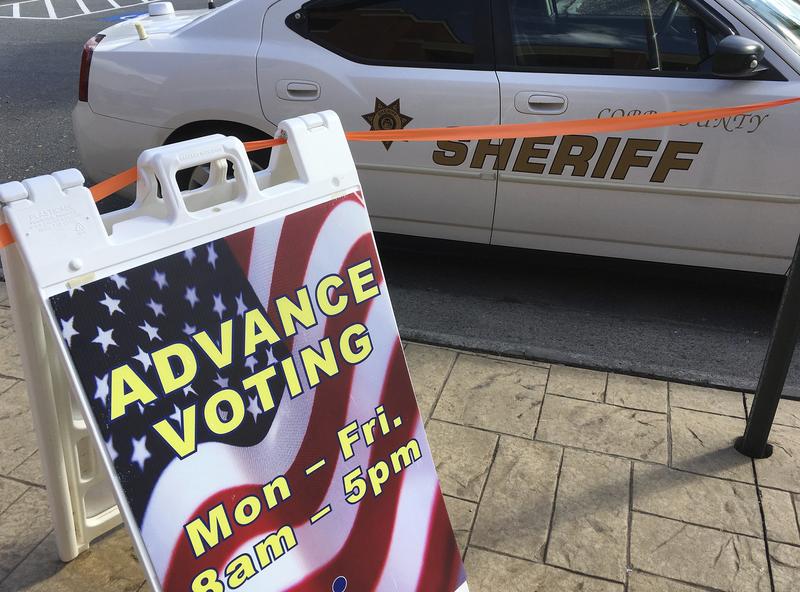BROOKE GLADSTONE: This is On the Media. I'm Brooke Gladstone.
BOB GARFIELD: And I'm Bob Garfield. This election season, Trump has warned the electorate to fear a long list of things, including illegal immigrants, apocalypse at the hands of ISIS and now, dead people voting.
[CLIP]:
DONALD TRUMP: They even want to try to rig the election at the polling booths and, believe me, there’s a lot goin’ on. People that have died 10 years ago are still voting.
[END CLIP]
BOB GARFIELD: What Trump’s talking about is voter fraud, the keystone of his claims that the election will be rigged. But Michael Waldman, president of The Brennan Center for Justice at NYU School of Law and author of the book, The Fight to Vote, says, don’t worry.
MICHAEL WALDMAN: In-person voter impersonation, which is what Trump is talking about, is vanishingly rare. One study for the Washington Post looked at a billion ballots cast over the past decade and found 31 documented examples of in-person voter impersonation.
BOB GARFIELD: Even before Trump started running his mouth, this bogeyman of voter fraud has been presented, at least as a pretext, to pass all sorts of voter ID laws.
MICHAEL WALDMAN: We have on the books right now about 15 new laws in this election that would make it harder for many Americans to vote, in one way or another, for the first time since the Jim Crow era, and voter fraud has been used as the justification for these laws that really hit minority communities the hardest, that hit young people. And recently, there were documents leaked from an investigation of Governor Scott Walker and his political operation around a judicial election. It was actually a campaign finance investigation. But in the middle of these documents there is an email from one of his political aides to the other folks saying, well, it looks like this election isn’t gonna go so well for our candidate. Should we start claiming voter fraud now or wait ‘til people actually vote? I, I say we start now, and they all write back, you know, some version of, you know, good idea, you know. Over and over again, you hear of these allegations and they evaporate upon contact with any investigation, but they’re the pretext.
BOB GARFIELD: The notion of voter fraud was not invented out of whole cloth. There was a day, back in the latter part of the 19th century, when Tammany Hall, the great boss Tweed political machine that essentially governed New York City, made pretty sure that everything was gonna turn out just fine on Election Day.
MICHAEL WALDMAN: Politicians have wanted to stuff the ballot box ever since senators wore togas. In the 20th century, Lyndon Johnson, winning his first Senate race, when they, quote, “discovered” a box of votes cast in a southern Texas town called Alice, Texas, where 200 votes had been cast all for Lyndon Johnson in alphabetical order –
[BOB LAUGHS]
- and that was enough to win in the Senate. They called him “Landslide Lyndon.” There’s always a risk of misconduct but in all these instances it was, in a sense, what we would call election fraud. It was not stray individual voters walking in and pretending to be someone else. It was the politicians or the people on the other side of the table stuffing the ballot box or rigging things.
Even today, there are risks with voting machines, and there are greater risks with absentee ballots, where you can't see the person casting the vote. But the specific thing that Donald Trump is railing against doesn’t happen.
BOB GARFIELD: I noticed that Trump has homed in particularly on inner-city Philadelphia, where he has said that the ghost voters are just gonna be out of control. He did not mention the outlying western Philadelphia suburbs, which are also reliably blue but also almost entirely white.
MICHAEL WALDMAN: Rudy Giuliani, his surrogate, said explicitly, oh, this happens in the inner cities, and Trump has pointed to Philadelphia, and there's a not-very-far-below-the-surface racial subtext to all of this.
There’s an interesting psychological study that was done a couple of years ago where members of the public were asked what their position was on something like voter ID laws and they were shown a photograph of a voter. In some instances, the voter was black casting a vote and some white, and for white respondents, their support for voter ID laws went up when the photo was of a black person voting. We have a long, long and unfortunate history in, in our country of the racial divisions playing out in these election contexts, and this is gonna go in the history books as one of those moments.
BOB GARFIELD: If increasing percentages of the electorate no longer have faith in the security and, and sanctity of the voting process, where does that leave us?
MICHAEL WALDMAN: There have been fights over voting going back forever, but I can't think of a time, except maybe in the 1860 election of Abraham Lincoln, where one of the parties said, well, these results are not gonna be legitimate and we’re not gonna necessarily accept them.
Interestingly, you're seeing a number of Republican officials who run these elections in about 30 states say, no, it’s not rigged, no, look, there really isn’t a lot of voter fraud. I hope that’s an inflection point because so many of those same officials have used that fear to justify laws that don't make sense. Maybe now we can all agree on those facts and, and then move on to better policies
BOB GARFIELD: Michael, thank you very, very much.
MICHAEL WALDMAN: Thank you.
BOB GARFIELD: Michael Waldman is president of The Brennan Center for Justice at NYU and the author of The Fight to Vote.
